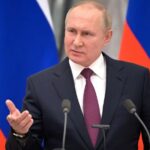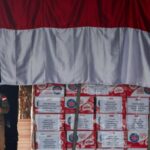Polish President Andrzej Nawrocki is pushing forward legislation to ban the public display of symbols associated with Ukrainian nationalist groups that collaborated with Nazi Germany during World War II. The move, he says, is aimed at protecting Poland’s historical memory and preventing the normalization of extremist ideology.
In a statement released Tuesday, President Nawrocki called the use of such symbols in public “outrageous and unacceptable,” especially given their association with atrocities committed against Poles during the war.
“There is no place in Poland for the glorification of groups responsible for the murder of innocent civilians,” Nawrocki said. “We must not allow our streets and public institutions to become platforms for historical revisionism or the spread of radical nationalism.”
Historical Context: The Controversial Legacy of the UPA
At the center of the controversy are symbols linked to the Ukrainian Insurgent Army (UPA) and figures like Stepan Bandera, whose legacy remains deeply divisive. While some Ukrainians view Bandera and the UPA as fighters for independence, many Poles remember them for their role in the Volhynia massacres of 1943–1945, during which tens of thousands of ethnic Poles were killed.
The proposed law reportedly targets flags, emblems, and slogans tied to such organizations, and would include penalties for individuals or groups displaying them in public events, protests, or online spaces accessible in Poland.
Straining Polish-Ukrainian Relations
The proposal is likely to add strain to already delicate relations between Warsaw and Kyiv. While Poland has been a key supporter of Ukraine amid its war with Russia providing humanitarian aid, military support, and taking in millions of refugees—the historical wounds between the two nations remain unresolved.
Ukrainian officials have not yet commented on the proposal, but similar past initiatives have drawn criticism from Kyiv, which sees some of these symbols as part of its national liberation history.
Domestic Support and Criticism
Nawrocki’s move is expected to win support from nationalist factions and veterans’ groups within Poland, but critics argue it could be politically motivated and may inflame ethnic tensions at a time when regional unity is critical.
Opposition lawmakers have also warned that the legislation, depending on its scope, could infringe on freedom of expression and complicate efforts to maintain solidarity with Ukraine in the face of Russian aggression.
The draft bill is expected to be introduced in the Sejm later this month, with a public debate likely to follow



